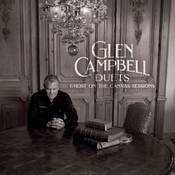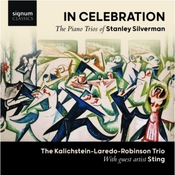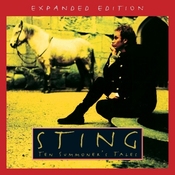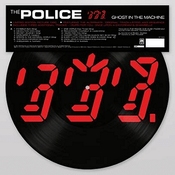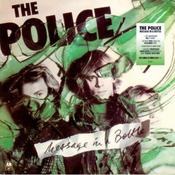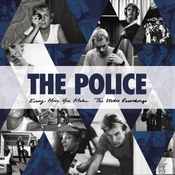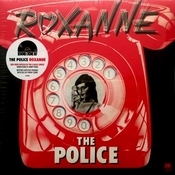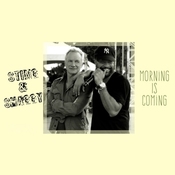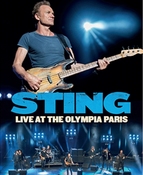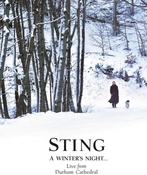Symphonicities
- Next To You lyrics
- Englishman In New York lyrics
- Every Little Thing She Does Is Magic lyrics
- I Hung My Head lyrics
- You Will Be My Ain True Love lyrics
- Roxanne lyrics
- When We Dance lyrics
- End Of The Game lyrics
- I Burn For You lyrics
- We Work The Black Seam lyrics
- She's Too Good For Me lyrics
- The Pirate's Bride lyrics

Soundbites
1.Next To You - Sting, Vocals; Jo Lawry, Backing Vocals; Rob Mathes, Piano; David Finck, Acoustic Bass; David Cossin, Percussion; Joe Bonadio, Percussion; Featuring the New York Chamber Consort (Lisa Kim, Concertmaster); Conducted by Rob Mathes
2.Englishman In New York - Sting, Vocals; Jo Lawry, Backing Vocals; Rob Mathes, Piano; David Finck, Acoustic Bass; Aaron Heick, Clarinet Solo; David Cossin, Percussion; Joe Bonadio, Percussion; Featuring the New York Chamber Consort (Lisa Kim, Concertmaster); Conducted by Rob Mathes
3.Every Little Thing She Does Is Magic - Sting, Vocals; Jo Lawry, Backing Vocals; Rob Mathes, Piano and Acoustic Guitar; David Finck, Acoustic Bass; David Cossin, Percussion; Featuring the London Players (Jacqueline Shave, Concertmaster); Conducted by Rob Mathes
4.I Hung My Head - Sting, Vocals; Jo Lawry, Backing Vocals; Dominic Miller, Guitar; Ira Coleman, Bass; David Cossin, Percussion; Featuring The Royal Philharmonic Concert Orchestra (Gerald Gregory, Concertmaster); Conducted by Steven Mercurio
5.You Will Be My Ain True Love - Sting, Vocals; Jo Lawry, Vocals; Dominic Miller, Guitar; Ira Coleman, Bass; David Cossin, Percussion; Featuring The Royal Philharmonic Concert Orchestra (Gerald Gregory, Concertmaster); Conducted by Steven Mercurio
6.Roxanne - Sting, Vocals; Jo Lawry, Backing Vocals; Rob Mathes, Piano and Acoustic Guitar; David Finck, Acoustic Bass; David Cossin, Percussion; Featuring the London Players (Jacqueline Shave, Concertmaster); Conducted by Rob Mathes
7.When We Dance - Sting, Vocals; Jo Lawry, Backing Vocals; Dominic Miller, Guitar; Ira Coleman, Bass; David Cossin, Percussion; Featuring The Royal Philharmonic Concert Orchestra (Gerald Gregory, Concertmaster); Conducted by Steven Mercurio
8.End Of The Game - Sting, Vocals; Jo Lawry, Backing Vocals; Dominic Miller, Guitar; Ira Coleman, Bass; David Cossin, Percussion; Featuring The Royal Philharmonic Concert Orchestra (Gerald Gregory, Concertmaster); Conducted by Steven Mercurio
9.I Burn For You - Sting, Vocals and Acoustic Guitar; Jo Lawry, Backing Vocals; David Cossin, Percussion Soloist; Joe Bonadio, Additional Percussion; Ben Witman, Loop Programming; Featuring the New York Chamber Consort (Lisa Kim, Concertmaster); Conducted by Rob Mathes
10.We Work The Black Seam - Sting, Vocals; Jeff Kievit, Lead Trumpet; Jim Hines, James Delagarza, Dylan Schwab, Trumpets; Larry DiBello, Chad Yarborough, David Peel, Theo Primus, Horns; Birch Johnson, Dick Clark, Trombones; Jeff Nelson, Bass Trombones; Marcus Rojas, Tuba; Joe Bonadio, Percussion; Conducted by Rob Mathes
11.She's Too Good For Me - Sting, Vocals and Acoustic Guitar; Dominic Miller, Electric Guitar; Jo Lawry, Vocals; Joe Bonadio, Percussion; Featuring the New York Chamber Consort (Lisa Kim, Concertmaster); Conducted by Rob Mathes
12.The Pirate's Bride - Sting, Vocals; Jo Lawry, Backing Vocals; Joe Bonadio, Percussion; Featuring the New York Chamber Consort (Lisa Kim, Concertmaster); Conducted by Rob Mathes
Backgrounder
Review from the Pittsburgh Tribune by Bob Karlovits
Sting's voice is well suited to many forms. It can move from the social conscience of 'We Work the Black Seam' to the emotion of 'Next to You.' His current album 'Symphonicities' shows how it can work with a chamber orchestra and with The Police. It is a collection 12 songs ranging from hits such as 'Every Little Thing She Does Is Magic' to the not-as-popular 'The Pirate's Bride.' The Royal Philharmonic Concert Orchestra, the London Players and the New York Chamber Consort provide the backup in arrangements that tend to be right on the money, even if one or two take a little listening to accept. The brass of 'We Work the Black Seam,' for instance, has an appropriate power and 'Englishman in New York' is accurately bright, but 'Every Little Thing' seems a bit out of place and a little affected. He is on tour supporting this album, but, alas, no visit is scheduled here.
Review from Today online by Christopher Toh
Sting has tried out practically every genre in the musical universe, so an orchestral rework of his songs seems a natural thing to do. Possibly inspired by the fact that people liked his lute-ish renditions of 'Fields Of Gold' and 'Message In A Bottle', this is an album's worth of Police and solo material recreated with orchestras and classical ensembles. You know what? It works really well. 'I Hung My Head', for example, is given a gravitas not found in the original, making it a much bigger song than it was (although in my opinion, Johnny Cash's sombre version is probably still the best). Other tracks that score include a perkier reworking of 'Englishman In New York'; 'I Burn For You', which actually sounds less melodramatic than the original - yes, it's a good thing; 'We Work The Black Seam', as its looping riff is given an almost theatrical nuance - you can almost see this playing out in a musical or in a movie; and 'Roxanne', which considering how many different ways this song has been covered, offers a new emotional empathy - although it ends terribly. But while songs such as 'Next To You' and 'Every Little Thing Is Magic' seem to lose some of their magic in the reinterpretation, there are more high points here than there are low. Possibly one of his more satisfying latter day works.
Review from The Salt Lake Tribune by David Burger
Sting’s new set of orchestral arrangements of Police and solo songs is the cleverly titled 'Symphonicities' - a play on Police’s 1983 'Synchronicity' - and features the Royal Philharmonic Concert Orchestra, with whom he is joining on a world tour. The 57-year-old’s warm, flexible voice is in fine form, and the best moments are when he takes a stab at reinventing classics such as 'Roxanne', where he adds further depth to an already complex song with a different vocal melody as well as Latin percussion. 'Every Little Thing She Does is Magic', on the other hand, isn’t served by a heavy-handed inclusion of woodwinds. But there are plenty of pleasures, from emotional, lush readings of 'When We Dance' and 'Next to You' and b-sides. It’s a satisfying album for symphony lovers, as well as all those who can appreciate elegant pop songcraft.
Review from The Los Angeles Times by Mikael Wood
Leave it to Sting to join the current craze for big-band albums not with a set of standards or cool-hunting covers but with a collection of his own songs. Even during his early days with the Police, Sting carried himself with the assured air of someone whose artistic significance was a long-established fact; a couple of decades later, he gives the impression that a search for deeper, more worthwhile material simply yielded no results. Yet if Sting's confidence can sometimes come across as arrogance, it's also what makes 'Symphonicities' work: Here's a songwriter with enough belief in his creations to risk radically retooling them. Accompanied by London's Royal Philharmonic Concert Orchestra (with whom he's in the midst of a world tour), Sting reimagines 'Roxanne' as a lush Latin ballad and gives 'Every Little Thing She Does Is Magic' a swelling Celtic thrust. Not everything on the 12-track disc is such a departure: 'Englishman in New York', for instance, sounds more or less like the original studio version, as does 'You Will Be My Ain True Love', the singer's Appalachia-inspired contribution to the film 'Cold Mountain'. For those selections, perhaps Sting concluded that perfection hardly needed improving.
Review from The Boston Globe by Sarah Rodman
An inveterate musical adventurer, Sting is no stranger to rearranging his catalog. Whether that’s meant acoustic reworkings, Spanish-language retrofits, or live improvisations, he fearlessly pushes his own songs around. So it was just a matter of time before the famously posh Brit would go the symphonic route. Certainly an orchestra is a big enough umbrella, but some of the songs - from both the Police and Sting’s solo career - definitely end up getting wet. Several tunes offer expected pleasures, including the crisp pluck lent to 'Englishman in New York' by a phalanx of string players. Also expected is the way that some tracks feel weighed down by the “serious’’ addition of an orchestra, as with “Every Little Thing She Does Is Magic', which, although pretty, is sapped of a bit of its breeziness. The album’s biggest revelation is 'Roxanne'. That such an exhaustively played song could exude new nuances - more yearning and melancholy than demanding anger thanks to a gorgeously mournful cello solo - is impressive. One consistent element, however, is Sting’s vocals, which are as warm, elastic, and expressive as ever.
Review from The Montreal Gazette by Jordan Zivitzr
There was good reason to fear Sting's orchestral album. For one thing, it appears on the same label that issued his daring but deadly lute collection 'Songs from the Labyrinth' (2006) and last year's chin-stroking seasonal release 'If on a Winter's Night...' For another thing -well, it's Sting's orchestral album. So the arrangements on 'Symphonicities' come as a blessed relief. Instead of the ponderous interpretations many listeners may have dreaded, these are airy and, when appropriate, lively. The song selection is similarly inspired, avoiding most of the obvious choices. There's no 'Fields of Gold', no 'Every Breath You Take'. Rather, the album begins with a suitably energized treatment of the Police's 'Next to You'. Perhaps it's too suitable. In his amusingly orgasmic liner notes, Rolling Stone's Anthony DeCurtis claims these songs "have not simply been rearranged, but fully reimagined in orchestral terms." Yet the majority of 'Symphonicities' 12 tracks sound exactly like you would expect them to, with strings and brass interpreting the familiar guitar and keyboard parts. This is a complaint regarding the arrangers' lack of adventure, not regarding execution. The version of Englishman in New York here is redundant, barely expanding on the original's elegance, but the tasteful crescendos in 'I Hung My Head' enhance the murder ballad's remorse, and 'Every Little Thing She Does Is Magic' retains its loose-limbed celebration. The noticeable attempts to fully reimagine Sting's songs are less consistent. 'Roxanne' is preposterous - a passionless slow burn from the orchestra, backing Sting's lite-jazz croon. The result is comparable to Eric Clapton's unplugged 'Layla', sapping all desperation and heat from a song that demands both. By contrast, 'We Work the Black Seam' loses its '80s shackles and gains a rich brass arrangement that emphasizes the forlorn heart of the miners' lament. In at least this one instance, Sting has found not just a new interpretation, but a superior one. Even when 'Symphonicities' falls short of the source material, though, it may reward listeners who have been turned off by Sting's classical aspirations before. For the first time in a long time, his solo career seems more about honouring the song than honouring the ego.
Review from The Dallas Morning News by Mario Tarradell
Sting's symphonic turn is often brilliant... Sting still experiments. Merging pop and rock with classical isn't novel, but the Briton, a.k.a. Gordon Sumner, actually makes the usually sleepy combination intriguing, deserving of repeated listens. 'Symphonicities', the CD souvenir of his Symphonicity Tour, opens with brilliant reinventions of 'Next to You', 'Englishman in New York' and 'Every Little Thing She Does Is Magic'. Backed by grand classical musicians, the songs gain - not lose - intensity and energy. Then the proceedings turn a bit esoteric. 'Roxanne' as a brooding ballad? 'We Work the Black Seam' as a dirge? Thought-provoking, but that'll take time to digest.
Review from The New York Daily News by Jim Farber
Sting's 'Symphonicities' finely balances old pop-rock tunes with Royal Philharmonic's classic sound - Sting's new album begins with a boo-boo so wounding, you wonder how it can possibly recover. "Symphonicities" means to re-imagine some of the star's best known songs with The Police, as well as those from his solo career, in collaboration with a full symphony orchestra (namely The Royal Philharmonic). But the disc's kick-off number - a take on the Police's brisk and choppy "Next To You" - stumbles into one of the deepest pot-holes for an orchestral/pop hybrid. The arrangement makes the strings imititate a rock band rather than finding a way to reinvent it. The violins, violas and cellos hack away at the riff as if they were amped-up guitars, which only makes them sound weak and phoney by comparison. Happily, that's the project's only outright stumble. Cynics on the subject of Sting will surely be surprised by the CD's lack of pretention. For the most part, it avoids bloat or syrrup, instead finely balancing pop/rock concerns with the classical kind. Along the way, some songs find fresh character. "Roxanne" employs darker chords than the original and, so, paints the central relationship between the narrator and the prostitute as more frought. "I Hung My Head," already one of Sting's best, and least appreciated songs, finds even more guilt and gravity in the character through the anxious orchestrations. Mainly, though, the re-thinks emphasize what was already there. "Englishman in New York" seems more light and playful through the whimsical strings and wily woodwinds, while the delightful orchestrations in "Every Little Thing She Does Is Magic" literalize the idea of finding endless pleasure in someone you're smitten with. Few of the melodies get a genuine shake-up, which explains why fans won't be shocked by anything they hear. For that, you have to look to the recent work of a Sting peer. Back in February, Peter Gabriel radically recast pop songs with classical arrangements on his CD "Scratch My Back." He used the orchestra so inventively, they turned the pieces into psychologically potent art songs. (It probably helped that Gabriel left rock instruments behind entirely). By contrast, "Symphonicities," presents rock and classical forms more as respectful collegues than as true friends. They collaborate peacefully, and likeably, without ever finding in each other any great fire.
Review from The Toronto Star by Ben Rayner
Don’t be fooled by the Mondrian-inspired CD case, classical label or the fact that Sting is marking Tuesday’s launch of this album by singing at the Metropolitan Opera. This is nothing more - or less - than the English pop-rock veteran plunging back into the gold mine of his Police-era output. He and some new friends reintroduce us to a dozen nuggets of musical magic borne of his imagination. Forget the Police; here, Sting sings with a symphony orchestra (with guitar and drums thrown in for good measure) in clever and tasteful new arrangements that, to my ear, often an improvement over the original. 'Roxanne' has never sounded so richly soulful, and 'The Pirate’s Bride' happily totes along a substantial sonic dowry; only the rocking-out 'Next to You' feels contrived. Sting himself is sounding more mellow, yet no less dramatically charged, than he did in the 20th century. Although the Royal Philharmonic Orchestra gets album billing, the New York Chamber Consort is the band on half the tracks. Top track: 'We Work the Black Seam', a coal-mining history lesson, now laced with a sneaky-spiky brass band-and-drum accompaniment.
Review from American Noise by Preston Jones
Although 'Symphonicities' appears, on its surface, to be the sort of stunt a mid-career pop star would embrace as an excuse to tour, Sting has actually created a work that rewards examination. Other giants in his field have tried - and failed - to meld pop structure with classical forms (a couple guys named Paul McCartney and Billy Joel spring to mind), but where McCartney and Joel tried to create something brand new, Sting wisely retrofits his greatest successes as orchestral works - of a sort. On paper, 'Symphonicities' would seem a straightforward “re-imagining” of classics like 'Every Little Thing She Does is Magic' or 'Roxanne' with an emphasis on soaring strings. Sting doesn’t seem interested in simply placing his canon in a new context without getting his hands a little messy. He’s fully present throughout the album, sounding reinvigorated by the fresh context for these songs. Working with the Royal Philhamonic Concert Orchestra (conducted by Stephen Mercurio) and from arrangements by Mercurio, David Hartley and Rob Mathes, Sting reaches a satisfactory middle ground. The dozen tracks retain key elements of his most indelible works (Englishman in New York and She’s Too Good for Me) while pushing the source material in compelling new directions. Often, the mood is more jazzy - befitting Sting’s roots in the polyglot-inspired Police and his later, pan-global solo output - than strictly starchy. The Royal Philharmonic Concert Orchestra sounds remarkably loose and lively throughout 'Symphonicities', lending cuts like When We Dance a mournful yet luminous sensuality. In concert, Sting is known for drastically re-working the warhorses, almost to the point of impenetrability. His penchant for shaking up the standards is reined in here, although there are a few moments where his vocals threaten to skitter away from the orchestra. What 'Symphonicities' does best is allow listeners to appreciate Sting’s compositions anew. While certain tracks, like the Police singles or Englishmen in New York”are plenty familiar, Symphonicities also provides lesser-known offerings, such as The End of the Game and We Work the Black Seam a chance to shine, possibly even inviting a dive into Sting’s often-underrated back catalog. The album pulls off an increasingly tricky accomplishment: burnishing an artist’s legacy without undermining previous works or seeming like a crass grab for dollars.
Review from The Times by Pete Paphides
Explaining the impetus behind his latest album, 'Symphonicities', Sting says: "I have always had n affinity for classical music... and still make a daily practice of playing selections from J.S. Bach... not that anyone would want to pay money to hear my efforts in this field." Such modesty was conspicuous by its absence when he recorded his 2006 lute opus 'Songs From The Labyrinth' or his 2005 'Twin Spirits' project, in which he read out the correspondence between Robert Schumann and his wife Clara over music by the German composer. Fearlessness is a term often bandied around in association with hipper artists - Lou Reed's tour de force of passive-aggressive petulance, 'Metal Machine Music'; MGMT's utter circumvention of melody on their new album - but Sting is blessed with a striking sort of fearlessness, too. To him, classical music presents the same tantalising set of challenges that the traffic intersection in Hampstead has for George Michael at 2am on a Sunday morning. And sure enough, just as George doesn't always crash his Range Rover into Snappy Snaps every time he ventures into Hampstead, some of the new orchestral arrangements of Sting's songs on 'Symphonicities' leave surprisingly little damage. On 'Every Little Thing She Does Is Magic' the frantic showboating of the recorded version is supplanted by a treatment that complements the song's lovedrunk sentiments. And even if newly made-over 'Roxanne' no longer bristles with the grim desolation of Parisian backstreets, the fact is that this particular collision of pop and classical sensibilities could have been worse.



















